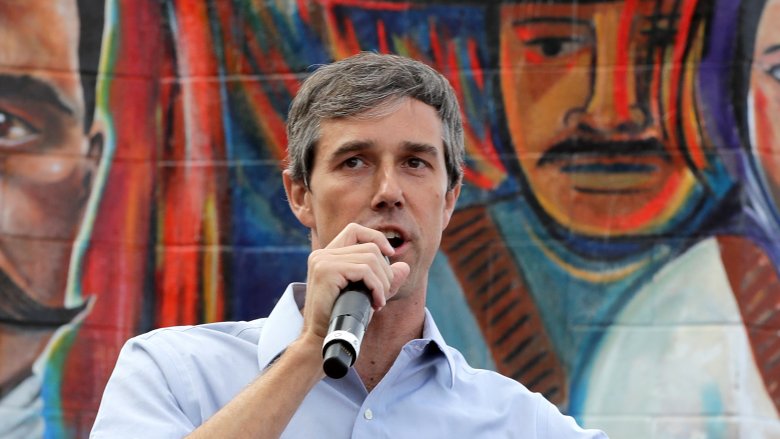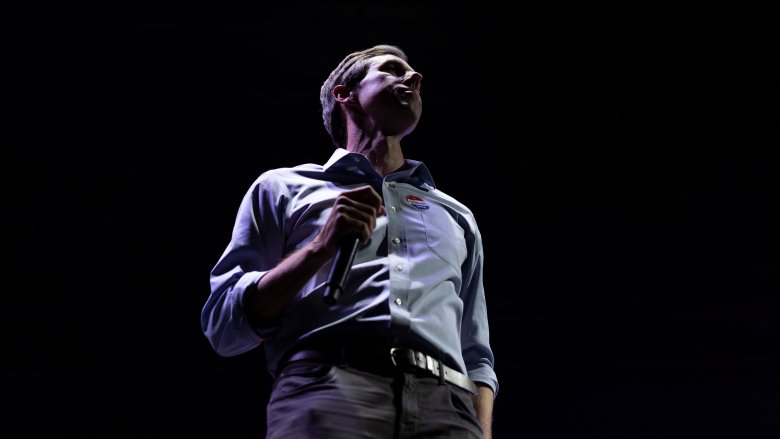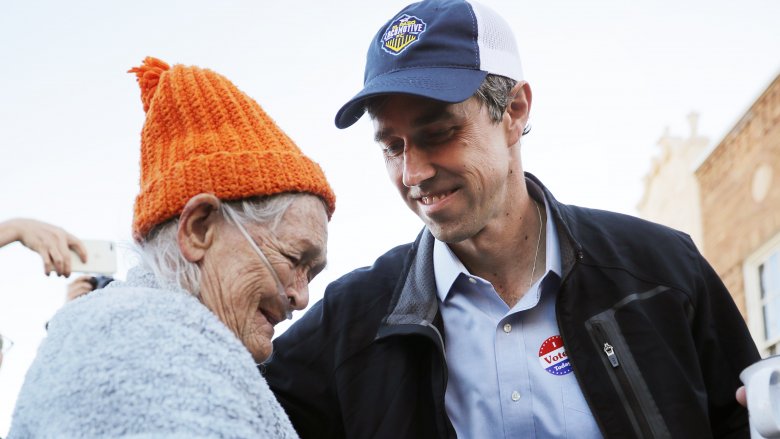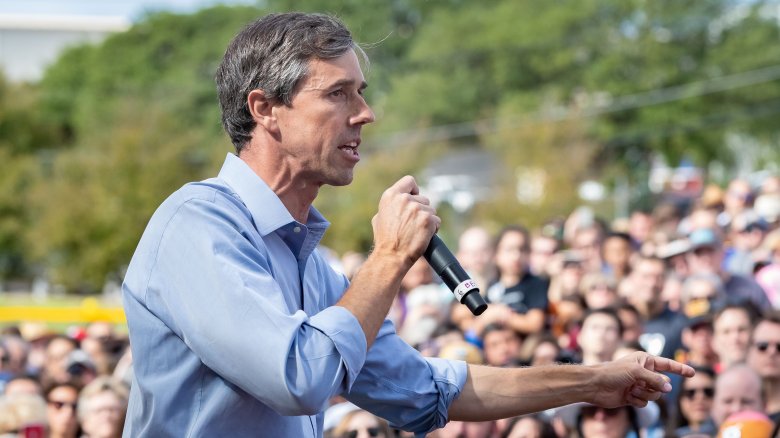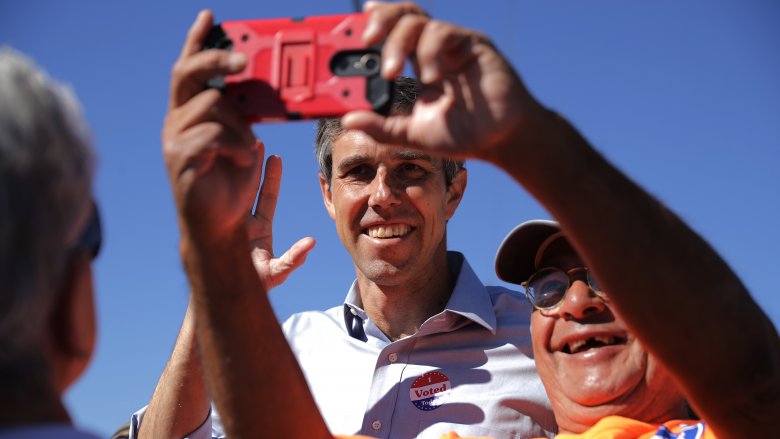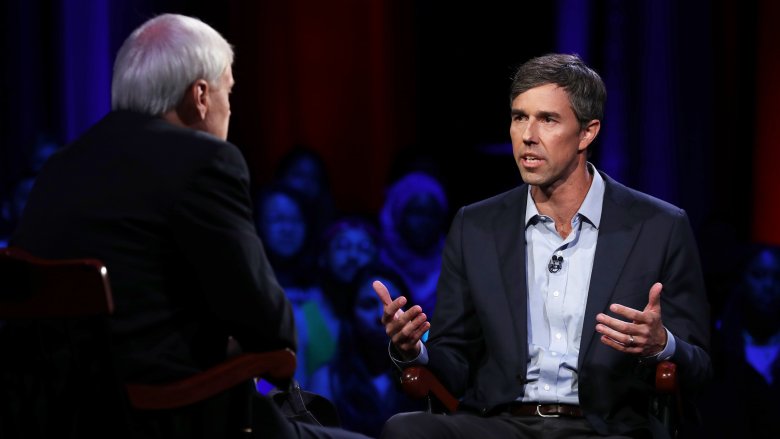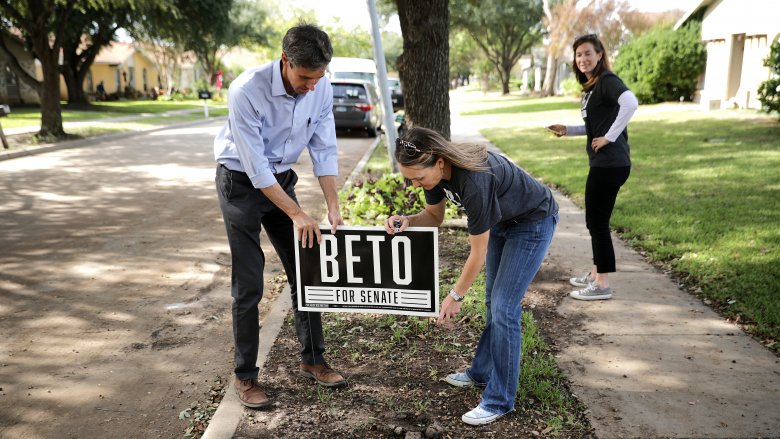The Untold Truth Of Beto O'Rourke
Ted Cruz may not be liked by virtually anyone in Washington and he may have once shut down the government almost single-handedly, but he is a very famous, well-funded senator. And during the midterms, he suddenly found himself in a very tight race. Beto O'Rourke seemed to come out of nowhere to launch the most successful Democratic Senate campaign in Texas for generations.
Beto got huge national attention. People across the country got invested in a race they couldn't vote in, hoping for another Democrat in the Senate, but even better, one who would beat Ted Cruz. Beto seemed like a genuinely cool guy, who released videos of himself skateboarding and air drumming. In the end, he lost, but by only three points.
Now people are talking about Beto 2020, even though as of now he swears he isn't running. But he probably will. So just who is this guy?
He got his nickname as a child
Robert Francis O'Rourke was born to, as you can probably guess, a ridiculously Irish-American family. His grandfather had the same name, so to differentiate them little Robert went by Beto, a very common Hispanic nickname. Since the O'Rourke family had lived in El Paso for generations, that probably didn't seem like a weird choice.
But according to the Austin American-Statesman, the first attack ad Ted Cruz released against Beto sure tried to make it an issue. The radio jingle drew attention to the name change, saying Beto did it because he "wanted to fit in" in the Hispanic area, and not, you know, that his parents called him that from the beginning to avoid confusion. It also accused him of "hiding" this change from people, which was patently untrue.
The decision to try and make Beto seem phony because he goes by a nickname was especially bizarre since Ted Cruz's name is not Ted. As Chris Cuomo pointed out on his CNN show, Ted is Rafael Edward Cruz. And as opposed to Beto, who was given his nickname by his parents as an infant, Cruz wrote in one of his books that he changed his own name in middle school to be more popular. Cruz seems to imply that by Anglicizing his Hispanic name, he was "assimilating the way it's supposed to be done," while Beto was simply pandering for immigrant votes.
Politics is in his blood
Beto's forefathers got into politics long before Beto ever considered it. His step-grandfather was Secretary of the Navy during the Kennedy administration, but it was his father's involvement that influenced him the most. According to Yahoo News, Beto didn't mention his dad much while campaigning for Senate, but his father, Pat, had been an El Paso powerhouse. Comparisons were often made between father and son, especially their ability to connect with people. Pat served as El Paso county commissioner and then county judge (not an actual courtroom position, but it made him the chief executive of the county, effectively in charge of its government). He was a Democrat and socially liberal, but fiscally conservative. In 1996, he would switch parties and run an unsuccessful campaign for Congress.
Pat once made national headlines for sending President Reagan a bill for all the healthcare costs incurred by local hospitals, who were required to treat anyone from Mexico who showed up, legal or not. Pat made it clear he didn't blame the immigrants for crossing the border to get help, but that the government needed to pay for it. He's credited with raising the issue, although Reagan never cut a check.
When Pat was campaigning, he dragged young Beto around with him. While it's something he appreciates now, Beto, being a normal kid, hated it at the time. Now however, he looks back and feels blessed to have had that early experience.
He's been arrested twice
One thing the Cruz campaign tried to use against Beto was his arrest record. But in a world where you can be elected president after admitting to sexual assault on camera, that was never going to phase people. Still, Beto does have a bit of a checkered past, according to PolitiFact.
He hasn't attempted to hide it, though. He mentioned his arrests and mugshots at numerous campaign stops. In 1995, he got done for burglary (which he described as trespassing). While attending the University of Texas at El Paso, Beto and some friends were messing around and decided to sneak under a fence on campus, which set off an alarm. After his arrest, the school declined to press charges.
The other issue is more serious. Beto was driving drunk in 1999, got pulled over, and was charged with a DWI. Since it was his first offense, he was allowed to enroll in "DWI school," and once he completed that program his misdemeanor was dismissed. It is never, ever okay to drive while drunk, and Beto hasn't tried to downplay it, saying, "I've been open about that since the very beginning. I have owned up to it and I have taken responsibility for it." Vox says when the Texas GOP tweeted Beto's DWI mugshot, it backfired. The internet went crazy with how hot Beto was when he was younger, completely ignoring his crime.
He was in two real bands
If having a rap sheet didn't make him enough of a cool bad boy, Beto was also in a couple bands when he was younger. And they actually went a lot further than just jamming in a garage.
According to Spin, Beto was once part of a punk band called Foss with Cedrick Bixler-Zavala (who went on to be part of At the Drive-In and Mars Volta.) They released two albums, including The El Paso Pussycasts in 1993, and toured the U.S. and Canada playing gigs in a station wagon. Up north, they once traded tickets to a concert for a woman's lockpick set. When they saw her again a year later, she was part of Placebo, and the bands played together. He also mixed with people who would end up forming Jonathan Fire*Eater and the Walkmen.
Beto then went on to play drums for Swedes and released another album with them in 1995. This was all despite being a totally clean-cut Ivy League jock at the time. Not very punk rock. Willie Nelson even jammed with him at the songwriter's annual Austin summer picnic. Of course, the Texas GOP tried to use this against Beto as well, tweeting out an old band photo. Beto looked ridiculously cool and the GOP looked out of touch.
He went through a quarter-life crisis
Beto attended Columbia in New York, but when he graduated with a degree in English in 1995, he suddenly felt lost, like so many people do at that age. According to Texas Monthly, while Ted Cruz was clerking for a Supreme Court justice, Beto was working temp and entry-level jobs.
He moved in with a rich family on the Upper West Side of New York and worked as a part-time nanny for their kids. That only lasted a few months. He helped his uncle build an internet service company when the internet was barely a thing. And he worked as a mover for Hedley's Humpers, specializing in art. Kids just out of college with no real experience were put in charge of "a Picasso or marble or an ancient samurai sword," and Beto said he can't believe he was trusted with that stuff.
While it sounds kind of fun, he says it was the "most depressed" he's been in his life. Things got a bit better when he moved to Brooklyn with some friends and got a job as a proofreader at a publishing company. Beto wrote stories in his spare time, because he's a sensitive bad boy, apparently. But he still felt restless and by 1998 had decided to return home to El Paso.
He's worked his way up the old-fashioned way
Beto O'Rourke seems to have really come into his own once he rediscovered politics. A local campaign he worked on in 2001 inspired him and he hasn't looked back.
According to Texas Monthly, Beto saw problems with El Paso, especially the fact that young people went away to college and never came back. He considered going for the county judgeship his father, Pat, had had before him, but in the end, Beto and two friends decided to run for city council. People say he was shy and had never shown interest in being a politician before, but he learned quickly. Even at the local level, campaigns can get mean. Beto's arrests were brought up and he was accused of being an alcoholic, but he and the two others won their races.
Beto concentrated on redevelopment, hoping to "bring life and energy and vitality" to a rundown part of the city. It was controversial, and he was accused of a conflict of interest because his father-in-law was a developer. People "slandered" him and denounced the plans as gentrification, and one activist tried unsuccessfully to get Beto recalled.
After six years on the council, Beto ran for his district's House seat. The New York Times reported at the time that he beat an eight-term incumbent Democrat in the primaries, despite then-President Obama and Bill Clinton campaigning for his opponent. His long shot paid off and he kept the seat since 2013. The Senate would have been the logical next step.
His liberal credentials are legit
Beto O'Rourke isn't the perfect Democrat, of course, but his liberal credentials do seem to be honest and long-term. He's been for legalizing marijuana seemingly forever. AlterNet reported in 2010 that the El Paso City Council passed a resolution, led by Beto, calling for a "comprehensive examination of our country's failed War on Drugs" and "the repeal of ineffective marijuana laws."
In an interview with Mother Jones filled with profanity, Beto talked passionately about immigration reform (a huge topic in a place like El Paso) and how much he hated Trump's wall idea. He's spoken fluent Spanish since he was a child and talks about how much he loves Mexico. He's extremely angry about the family separations at the border.
The Washington Post pointed out that Beto sided with kneeling football players, saying there is nothing more American than defending your rights. He's called for banning assault rifles (in Texas!), dealing with climate change, universal healthcare, and increasing the federal minimum wage. He's given his support to other liberal agendas as well, supporting abortion rights and ending for-profit prisons.
Beto believes in term limits, even for himself. During his Senate campaign, he promised not to serve more than two terms. That's one of the reasons he isn't a fan of Nancy Pelosi, basically saying she needs to step aside in the House and let other people have a chance to lead. And he was a very reluctant supporter of Hillary Clinton when she ran for president.
He's seriously good at campaigning
Beto seems to be absolutely brilliant at campaigning. He famously visited all 254 counties in Texas when he ran for Senate, a feat Cruz didn't come close to matching. And Texas Monthly says his ground game was on point long before that. After his initiative to revitalize areas of El Paso was greeted with suspicion by some people while he was on the city council, he started campaigning for it on foot. He met with business owners and residents and managed to convince a lot of them that his plan was good for the area.
When Beto first launched his long-shot bid to oust a sitting House Democrat in the primaries, he walked even more. He says he knocked on 16,000 doors and wore out two pairs of shoes during his campaign, but it paid off. Once he got elected, he didn't stay in Washington and enjoy being in charge. Since 2013, he held at least one town hall meeting with his constituents every single month. Some are specifically for certain groups, like veterans. He is known to hand out his personal cell phone number to a ridiculous number of people, just so they can always contact him if they have any issues.
After Hurricane Harvey struck, he headed to Houston to help out. But this involved basically suspending his campaign because he didn't mention he was running, or Ted Cruz, or anything political while he was there. He just wanted to be there.
He's been compared to other political phenoms, some of whom lost
His great campaigning skills, youth, and ability to connect with people has drawn a lot of comparisons to Obama. It's a major reason some people want to see him run for president in 2020. The Hill says Beto is creating the biggest buzz since "hope and change." To have only lost by three points, to an incumbent Republican, in Texas cannot be understated. He has national name recognition and a real chance. But they worry that if he waits for a more favorable election cycle, his moment will have passed. It could have happened with Obama, and it has happened to other political phenomenons before.
National Review reminds us of a guy named Victor Morales. Back in 1996, he too won the Texas Democratic Senate primary, beating out two better-known guys with more money. His win made him the first ever non-white Senate candidate in state history. Suddenly, everyone was talking about this "humble teacher." He got huge buzz, just like Beto. Morales was covered in every major national newspaper and even celebrity-based magazine People talked to him.
Morales would go on to lose in the election by 11 points. Despite his hype, it was never close. After his loss, Morales would disappear off the political map. It's a different time, and Beto can keep his profile up easier now, but he has to be careful not to fall into that trap if he wants to be president. A loss, even a close one, could be the end.
The 'Beto effect' was huge
While Beto O'Rourke's loss was crushing to a lot of people, he had a huge positive impact. But the "Beto effect" was real and important.
According to the Philadelphia Tribune, Democrats across Texas did extremely well in the midterms. Even in a year where a blue wave was promised, this shocked a lot of political observers. While well-run individual campaigns obviously had a huge part in it, Beto, and the chance to vote for him, drove a lot of people to the polls in the end.
More people in Texas voted in the 2018 midterms than in any midterm since 1966. It was only barely fewer than voted in the presidential election of 2016. Many traditionally Republican House seats flipped to the Democrats, including one win in Dallas County that outed an 11-term Republican. A nine-term Republican lost in Houston. Down ballot it was even more impressive. Described as a "blue tsunami," "nearly every countywide race from district attorney, county commissioner, county judge and various judgeships in Harris County, Fort Bend County and many other counties, were contested and the majority flipped from Republican to Democrat." Beto and his passionate campaigning and connection to people has been given most of the credit for this.
One Washington Post opinion writer said this meant Beto should run for John Cornyn's Senate seat in 2020, because he'd probably win this time. But others are determined to see him take on Trump.

